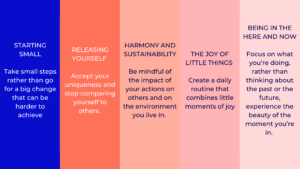 Pic Courtesy: career coaching in London
Pic Courtesy: career coaching in London
Ikigai is defined as one’s reason for being.
The question that arises is how to find one’s Ikigai and how to attain it.
Ken Mogi is a neuroscientist and has a Ph.D. in physics from the University of Tokyo. He has also authored over 100 books, including The Little Book of Ikigai.
Ken describes ikigai as the spectrum that reflects the complexity of life. He believes that it is important to understand that often, the simple things are what make people happy, and ikigai starts from very small things. He thinks that ikigai is an integrating concept — the umbrella term to describe everything that gives people joy.
Ken Mogi, states that there are five pillars that provide the essential foundation to allow your Ikigai to flourish. These pillars are:
Pillar 1: Starting small
Pillar 2: Releasing yourself
Pillar 3: Harmony and sustainability
Pillar 4: The joy of little things
Pillar 5: Being in the here and now
- Starting Small. The first pillar is “starting small”. The goals can be achieved by taking small steps. Instead of trying to attain perfection, effort should be put in to strive to be better. The important thing is the process, i.e. trying to attain the goal and learning from the attempts to do so.
- Releasing Yourself. The second pillar is “releasing yourself”. Releasing yourself is about finding happiness through acceptance. Accepting yourself is one of the most important and difficult tasks we face in our lives. Indeed, accepting oneself is one of the easiest, simplest, and most rewarding things you can do for yourself. People are born with unique traits, and while they might not be perfect, they can grow through experience, accept their individuality, and stop comparing themselves to others. Everyone can be comfortable pursuing their own way of engaging with life.
- Harmony and Sustainability. The third pillar is “harmony and sustainability”. Sustainability applies not only to man’s relation to nature but also to the modes of individual activities within a social context. You should show adequate consideration for other people and be mindful of the impact your actions might have on society at large. Ideally, every social activity should be sustainable. Thinking beyond selfish needs creates harmony and sustainability.
4. The Joy of Little Things. The fourth pillar is “the joy of little things”. Start the day with some ikigai and get into the habit of using the little things to create pleasurable, rewarding experiences that facilitate contentment. With these embedded in one’s routine, it doesn’t matter if people get recognized for their performance; no matter what, they have still experienced moments of happiness.
- Being in the here and now. The fifth pillar is “being in the here and now”. Present helps people to bring out their inner child, as children value the present since they have no definite idea of the past or future. Bringing out people’s inner child is a key attribute that brings happiness to their lives and those of their loved ones.
Ikigai doesn’t have to be something extravagant; we can find it even in the simplest things — anything that gives us joy. It helps us to understand that we don’t have to make our lives complicated, but, rather, that we can simply focus on accepting and being grateful for the things that we have and making the most out of things rather than searching for something that we don’t possess. Whenever we experience discontentment, it is important to reflect on what we are focusing on, see whether we can/should readjust, and think deeply about what things really matter to us.
Bottom Line
If you don’t know what your ikigai is yet,
your mission should be to discover it.”
Question
Have you discovered your IKIGAI?
Suggestions and value additions are most welcome
Please share your IKIGAI in the comments column. It may help someone else discover theirs.
Link to : Ikigai the mysterious word.
For regular updates, please register here
References and credits
To all the online sites and channels.
https://en.wikipedia.org/wiki/Ikigai
https://www.betterup.com/blog/what-is-ikigai
https://positivepsychology.com/ikigai/
https://www.betterup.com/blog/what-is-ikigai
https://ikigai-living.com/what-is-ikigai/
https://www.brit.co/ikigai-10-things-worlds-longest-living-people-do/
Disclaimer:
Information and data included in the blog are for educational & non-commercial purposes only and have been carefully adapted, excerpted, or edited from sources deemed reliable and accurate. All copyrighted material belongs to respective owners and is provided only for purposes of wider dissemination.
